BA Business Law and Ethics: Breach of Contract and Remedies Essay, UoS
VerifiedAdded on 2022/12/30
|7
|1675
|23
Essay
AI Summary
This essay provides a comprehensive overview of business law, focusing on contract law principles and the implications of a breach of contract. It begins by defining business law and contract law, highlighting the essential elements of a valid contract, including offer, acceptance, and consideration. The main body of the essay analyzes a case scenario involving Raymond, a part-time accountant, and Samantha, a struggling artist, who entered into a contract for accounting services. The essay examines the breach of contract by Samantha and explores the remedies available to Raymond, such as damages and specific performance. It also delves into the concept of counteroffers and the doctrine of promissory estoppel, discussing how these legal principles apply to the case. The essay concludes by summarizing the key findings, emphasizing the importance of understanding business law and contract law in resolving contractual disputes.
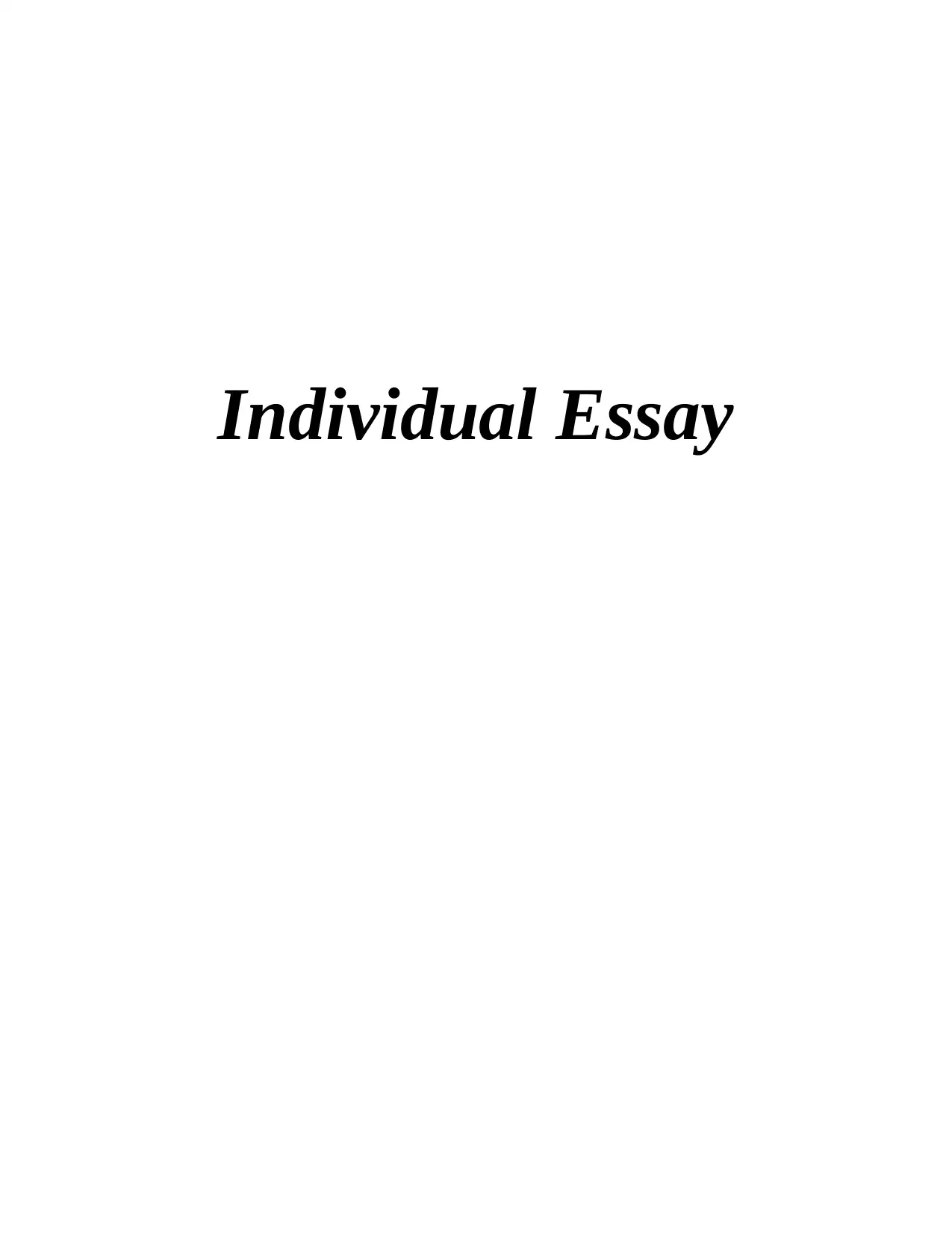
Individual Essay
Paraphrase This Document
Need a fresh take? Get an instant paraphrase of this document with our AI Paraphraser
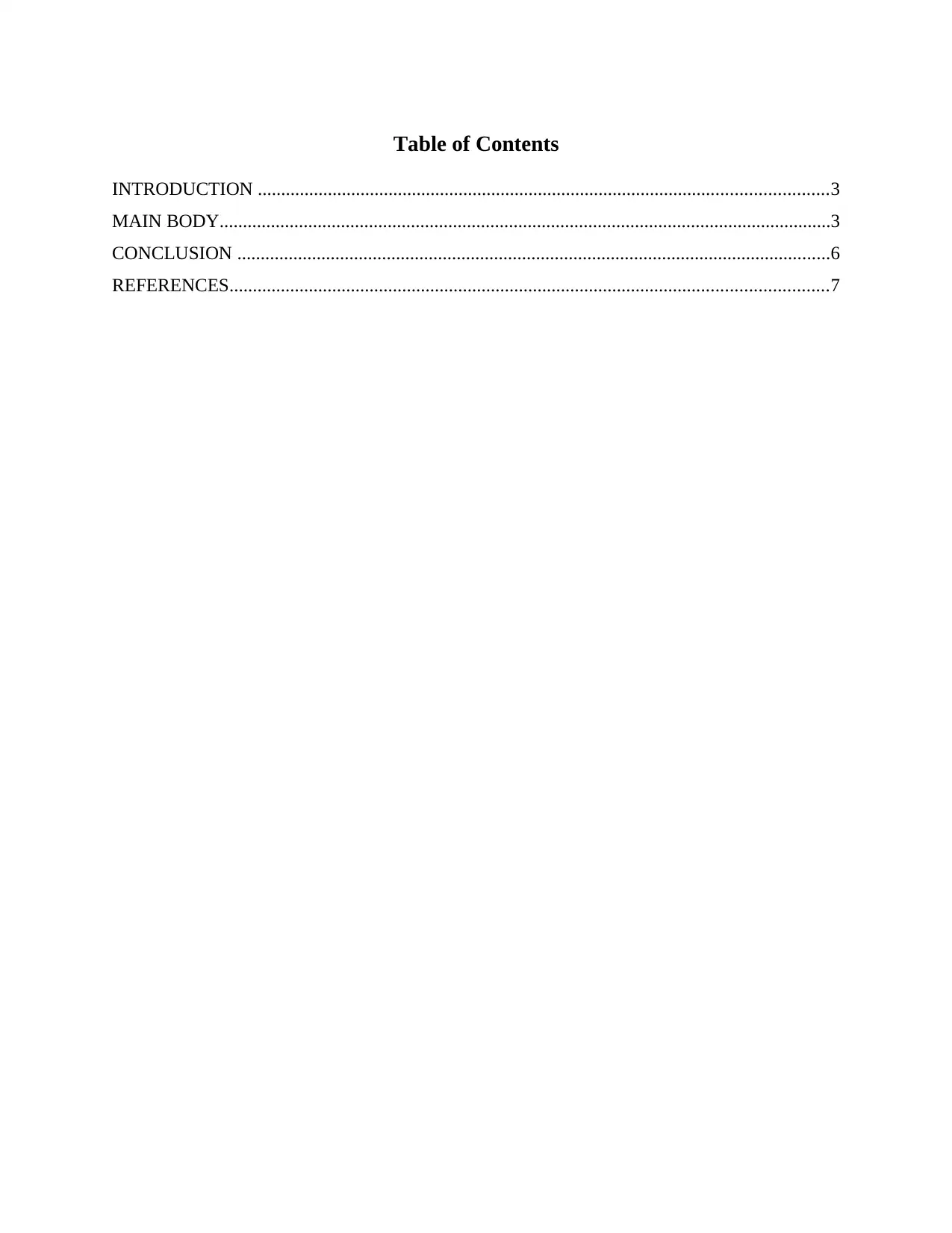
Table of Contents
INTRODUCTION ..........................................................................................................................3
MAIN BODY...................................................................................................................................3
CONCLUSION ...............................................................................................................................6
REFERENCES................................................................................................................................7
INTRODUCTION ..........................................................................................................................3
MAIN BODY...................................................................................................................................3
CONCLUSION ...............................................................................................................................6
REFERENCES................................................................................................................................7
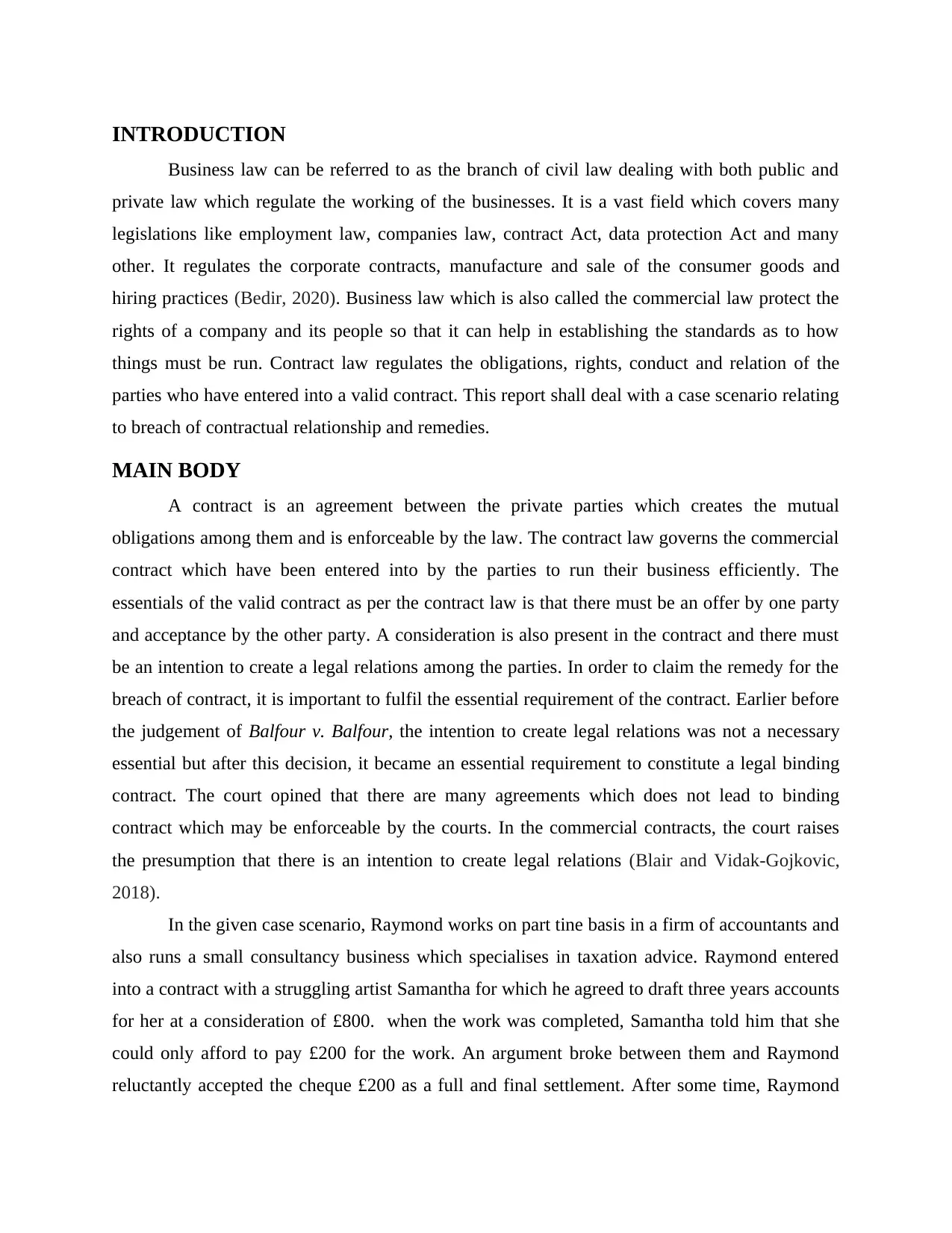
INTRODUCTION
Business law can be referred to as the branch of civil law dealing with both public and
private law which regulate the working of the businesses. It is a vast field which covers many
legislations like employment law, companies law, contract Act, data protection Act and many
other. It regulates the corporate contracts, manufacture and sale of the consumer goods and
hiring practices (Bedir, 2020). Business law which is also called the commercial law protect the
rights of a company and its people so that it can help in establishing the standards as to how
things must be run. Contract law regulates the obligations, rights, conduct and relation of the
parties who have entered into a valid contract. This report shall deal with a case scenario relating
to breach of contractual relationship and remedies.
MAIN BODY
A contract is an agreement between the private parties which creates the mutual
obligations among them and is enforceable by the law. The contract law governs the commercial
contract which have been entered into by the parties to run their business efficiently. The
essentials of the valid contract as per the contract law is that there must be an offer by one party
and acceptance by the other party. A consideration is also present in the contract and there must
be an intention to create a legal relations among the parties. In order to claim the remedy for the
breach of contract, it is important to fulfil the essential requirement of the contract. Earlier before
the judgement of Balfour v. Balfour, the intention to create legal relations was not a necessary
essential but after this decision, it became an essential requirement to constitute a legal binding
contract. The court opined that there are many agreements which does not lead to binding
contract which may be enforceable by the courts. In the commercial contracts, the court raises
the presumption that there is an intention to create legal relations (Blair and Vidak-Gojkovic,
2018).
In the given case scenario, Raymond works on part tine basis in a firm of accountants and
also runs a small consultancy business which specialises in taxation advice. Raymond entered
into a contract with a struggling artist Samantha for which he agreed to draft three years accounts
for her at a consideration of £800. when the work was completed, Samantha told him that she
could only afford to pay £200 for the work. An argument broke between them and Raymond
reluctantly accepted the cheque £200 as a full and final settlement. After some time, Raymond
Business law can be referred to as the branch of civil law dealing with both public and
private law which regulate the working of the businesses. It is a vast field which covers many
legislations like employment law, companies law, contract Act, data protection Act and many
other. It regulates the corporate contracts, manufacture and sale of the consumer goods and
hiring practices (Bedir, 2020). Business law which is also called the commercial law protect the
rights of a company and its people so that it can help in establishing the standards as to how
things must be run. Contract law regulates the obligations, rights, conduct and relation of the
parties who have entered into a valid contract. This report shall deal with a case scenario relating
to breach of contractual relationship and remedies.
MAIN BODY
A contract is an agreement between the private parties which creates the mutual
obligations among them and is enforceable by the law. The contract law governs the commercial
contract which have been entered into by the parties to run their business efficiently. The
essentials of the valid contract as per the contract law is that there must be an offer by one party
and acceptance by the other party. A consideration is also present in the contract and there must
be an intention to create a legal relations among the parties. In order to claim the remedy for the
breach of contract, it is important to fulfil the essential requirement of the contract. Earlier before
the judgement of Balfour v. Balfour, the intention to create legal relations was not a necessary
essential but after this decision, it became an essential requirement to constitute a legal binding
contract. The court opined that there are many agreements which does not lead to binding
contract which may be enforceable by the courts. In the commercial contracts, the court raises
the presumption that there is an intention to create legal relations (Blair and Vidak-Gojkovic,
2018).
In the given case scenario, Raymond works on part tine basis in a firm of accountants and
also runs a small consultancy business which specialises in taxation advice. Raymond entered
into a contract with a struggling artist Samantha for which he agreed to draft three years accounts
for her at a consideration of £800. when the work was completed, Samantha told him that she
could only afford to pay £200 for the work. An argument broke between them and Raymond
reluctantly accepted the cheque £200 as a full and final settlement. After some time, Raymond
⊘ This is a preview!⊘
Do you want full access?
Subscribe today to unlock all pages.

Trusted by 1+ million students worldwide
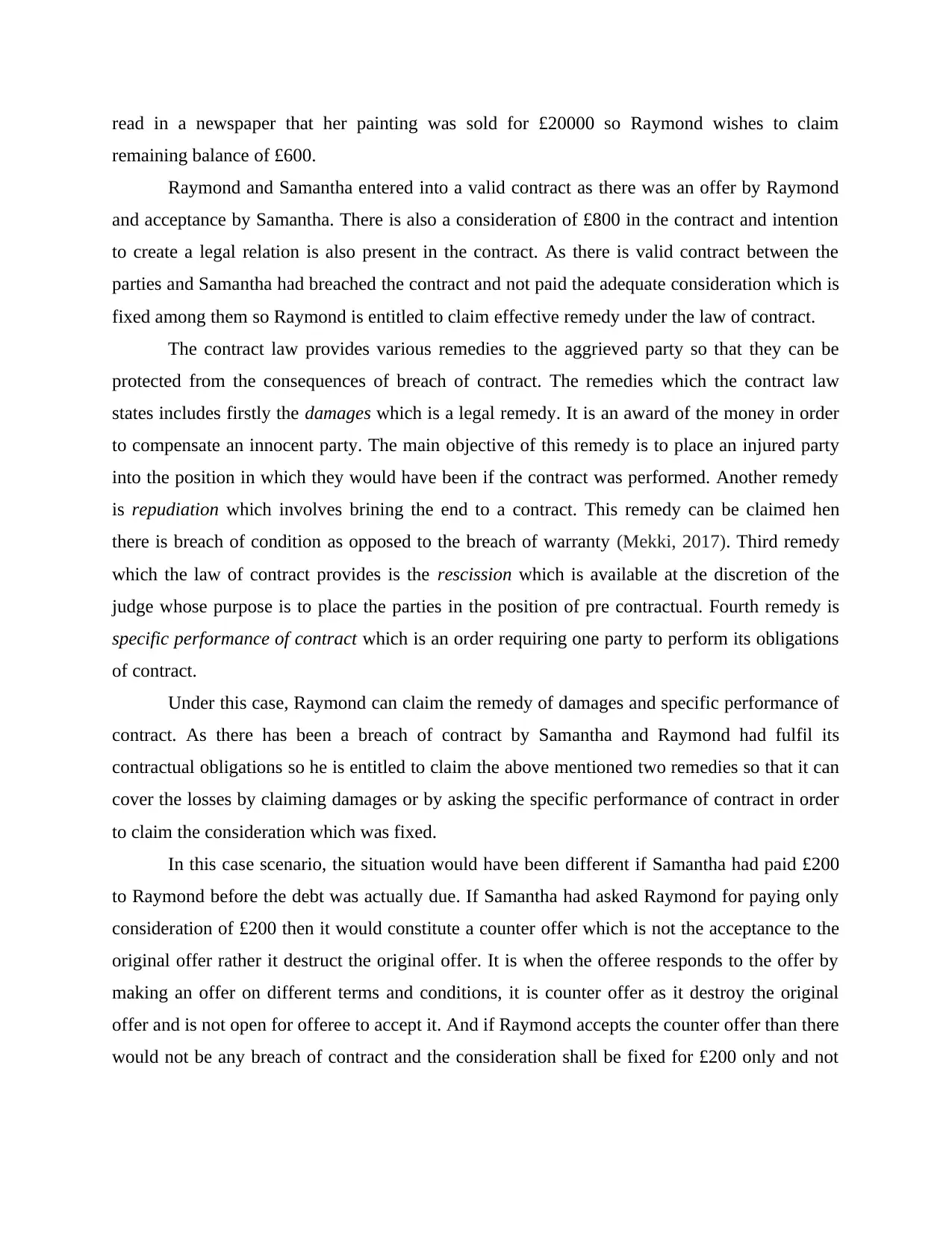
read in a newspaper that her painting was sold for £20000 so Raymond wishes to claim
remaining balance of £600.
Raymond and Samantha entered into a valid contract as there was an offer by Raymond
and acceptance by Samantha. There is also a consideration of £800 in the contract and intention
to create a legal relation is also present in the contract. As there is valid contract between the
parties and Samantha had breached the contract and not paid the adequate consideration which is
fixed among them so Raymond is entitled to claim effective remedy under the law of contract.
The contract law provides various remedies to the aggrieved party so that they can be
protected from the consequences of breach of contract. The remedies which the contract law
states includes firstly the damages which is a legal remedy. It is an award of the money in order
to compensate an innocent party. The main objective of this remedy is to place an injured party
into the position in which they would have been if the contract was performed. Another remedy
is repudiation which involves brining the end to a contract. This remedy can be claimed hen
there is breach of condition as opposed to the breach of warranty (Mekki, 2017). Third remedy
which the law of contract provides is the rescission which is available at the discretion of the
judge whose purpose is to place the parties in the position of pre contractual. Fourth remedy is
specific performance of contract which is an order requiring one party to perform its obligations
of contract.
Under this case, Raymond can claim the remedy of damages and specific performance of
contract. As there has been a breach of contract by Samantha and Raymond had fulfil its
contractual obligations so he is entitled to claim the above mentioned two remedies so that it can
cover the losses by claiming damages or by asking the specific performance of contract in order
to claim the consideration which was fixed.
In this case scenario, the situation would have been different if Samantha had paid £200
to Raymond before the debt was actually due. If Samantha had asked Raymond for paying only
consideration of £200 then it would constitute a counter offer which is not the acceptance to the
original offer rather it destruct the original offer. It is when the offeree responds to the offer by
making an offer on different terms and conditions, it is counter offer as it destroy the original
offer and is not open for offeree to accept it. And if Raymond accepts the counter offer than there
would not be any breach of contract and the consideration shall be fixed for £200 only and not
remaining balance of £600.
Raymond and Samantha entered into a valid contract as there was an offer by Raymond
and acceptance by Samantha. There is also a consideration of £800 in the contract and intention
to create a legal relation is also present in the contract. As there is valid contract between the
parties and Samantha had breached the contract and not paid the adequate consideration which is
fixed among them so Raymond is entitled to claim effective remedy under the law of contract.
The contract law provides various remedies to the aggrieved party so that they can be
protected from the consequences of breach of contract. The remedies which the contract law
states includes firstly the damages which is a legal remedy. It is an award of the money in order
to compensate an innocent party. The main objective of this remedy is to place an injured party
into the position in which they would have been if the contract was performed. Another remedy
is repudiation which involves brining the end to a contract. This remedy can be claimed hen
there is breach of condition as opposed to the breach of warranty (Mekki, 2017). Third remedy
which the law of contract provides is the rescission which is available at the discretion of the
judge whose purpose is to place the parties in the position of pre contractual. Fourth remedy is
specific performance of contract which is an order requiring one party to perform its obligations
of contract.
Under this case, Raymond can claim the remedy of damages and specific performance of
contract. As there has been a breach of contract by Samantha and Raymond had fulfil its
contractual obligations so he is entitled to claim the above mentioned two remedies so that it can
cover the losses by claiming damages or by asking the specific performance of contract in order
to claim the consideration which was fixed.
In this case scenario, the situation would have been different if Samantha had paid £200
to Raymond before the debt was actually due. If Samantha had asked Raymond for paying only
consideration of £200 then it would constitute a counter offer which is not the acceptance to the
original offer rather it destruct the original offer. It is when the offeree responds to the offer by
making an offer on different terms and conditions, it is counter offer as it destroy the original
offer and is not open for offeree to accept it. And if Raymond accepts the counter offer than there
would not be any breach of contract and the consideration shall be fixed for £200 only and not
Paraphrase This Document
Need a fresh take? Get an instant paraphrase of this document with our AI Paraphraser
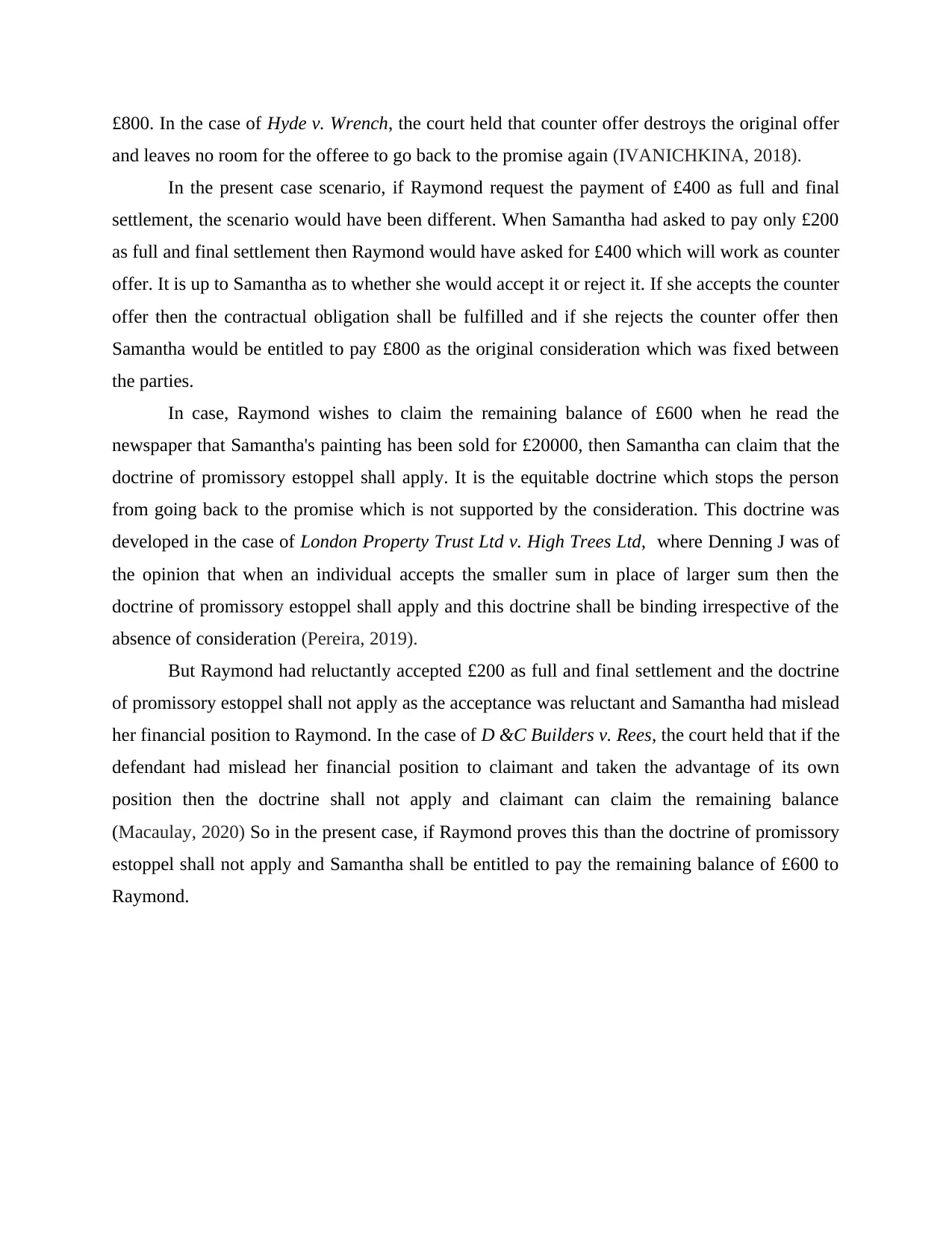
£800. In the case of Hyde v. Wrench, the court held that counter offer destroys the original offer
and leaves no room for the offeree to go back to the promise again (IVANICHKINA, 2018).
In the present case scenario, if Raymond request the payment of £400 as full and final
settlement, the scenario would have been different. When Samantha had asked to pay only £200
as full and final settlement then Raymond would have asked for £400 which will work as counter
offer. It is up to Samantha as to whether she would accept it or reject it. If she accepts the counter
offer then the contractual obligation shall be fulfilled and if she rejects the counter offer then
Samantha would be entitled to pay £800 as the original consideration which was fixed between
the parties.
In case, Raymond wishes to claim the remaining balance of £600 when he read the
newspaper that Samantha's painting has been sold for £20000, then Samantha can claim that the
doctrine of promissory estoppel shall apply. It is the equitable doctrine which stops the person
from going back to the promise which is not supported by the consideration. This doctrine was
developed in the case of London Property Trust Ltd v. High Trees Ltd, where Denning J was of
the opinion that when an individual accepts the smaller sum in place of larger sum then the
doctrine of promissory estoppel shall apply and this doctrine shall be binding irrespective of the
absence of consideration (Pereira, 2019).
But Raymond had reluctantly accepted £200 as full and final settlement and the doctrine
of promissory estoppel shall not apply as the acceptance was reluctant and Samantha had mislead
her financial position to Raymond. In the case of D &C Builders v. Rees, the court held that if the
defendant had mislead her financial position to claimant and taken the advantage of its own
position then the doctrine shall not apply and claimant can claim the remaining balance
(Macaulay, 2020) So in the present case, if Raymond proves this than the doctrine of promissory
estoppel shall not apply and Samantha shall be entitled to pay the remaining balance of £600 to
Raymond.
and leaves no room for the offeree to go back to the promise again (IVANICHKINA, 2018).
In the present case scenario, if Raymond request the payment of £400 as full and final
settlement, the scenario would have been different. When Samantha had asked to pay only £200
as full and final settlement then Raymond would have asked for £400 which will work as counter
offer. It is up to Samantha as to whether she would accept it or reject it. If she accepts the counter
offer then the contractual obligation shall be fulfilled and if she rejects the counter offer then
Samantha would be entitled to pay £800 as the original consideration which was fixed between
the parties.
In case, Raymond wishes to claim the remaining balance of £600 when he read the
newspaper that Samantha's painting has been sold for £20000, then Samantha can claim that the
doctrine of promissory estoppel shall apply. It is the equitable doctrine which stops the person
from going back to the promise which is not supported by the consideration. This doctrine was
developed in the case of London Property Trust Ltd v. High Trees Ltd, where Denning J was of
the opinion that when an individual accepts the smaller sum in place of larger sum then the
doctrine of promissory estoppel shall apply and this doctrine shall be binding irrespective of the
absence of consideration (Pereira, 2019).
But Raymond had reluctantly accepted £200 as full and final settlement and the doctrine
of promissory estoppel shall not apply as the acceptance was reluctant and Samantha had mislead
her financial position to Raymond. In the case of D &C Builders v. Rees, the court held that if the
defendant had mislead her financial position to claimant and taken the advantage of its own
position then the doctrine shall not apply and claimant can claim the remaining balance
(Macaulay, 2020) So in the present case, if Raymond proves this than the doctrine of promissory
estoppel shall not apply and Samantha shall be entitled to pay the remaining balance of £600 to
Raymond.
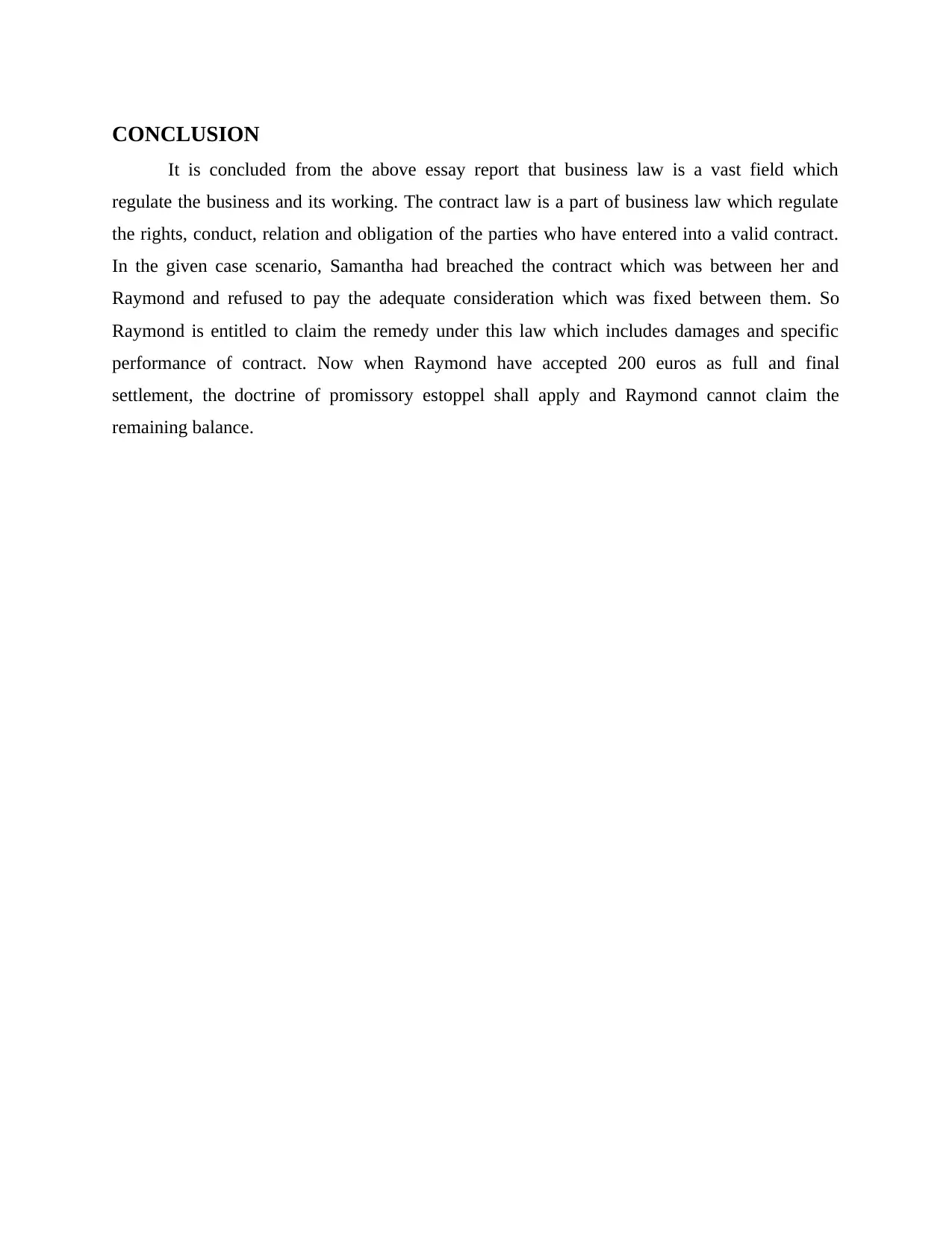
CONCLUSION
It is concluded from the above essay report that business law is a vast field which
regulate the business and its working. The contract law is a part of business law which regulate
the rights, conduct, relation and obligation of the parties who have entered into a valid contract.
In the given case scenario, Samantha had breached the contract which was between her and
Raymond and refused to pay the adequate consideration which was fixed between them. So
Raymond is entitled to claim the remedy under this law which includes damages and specific
performance of contract. Now when Raymond have accepted 200 euros as full and final
settlement, the doctrine of promissory estoppel shall apply and Raymond cannot claim the
remaining balance.
It is concluded from the above essay report that business law is a vast field which
regulate the business and its working. The contract law is a part of business law which regulate
the rights, conduct, relation and obligation of the parties who have entered into a valid contract.
In the given case scenario, Samantha had breached the contract which was between her and
Raymond and refused to pay the adequate consideration which was fixed between them. So
Raymond is entitled to claim the remedy under this law which includes damages and specific
performance of contract. Now when Raymond have accepted 200 euros as full and final
settlement, the doctrine of promissory estoppel shall apply and Raymond cannot claim the
remaining balance.
⊘ This is a preview!⊘
Do you want full access?
Subscribe today to unlock all pages.

Trusted by 1+ million students worldwide
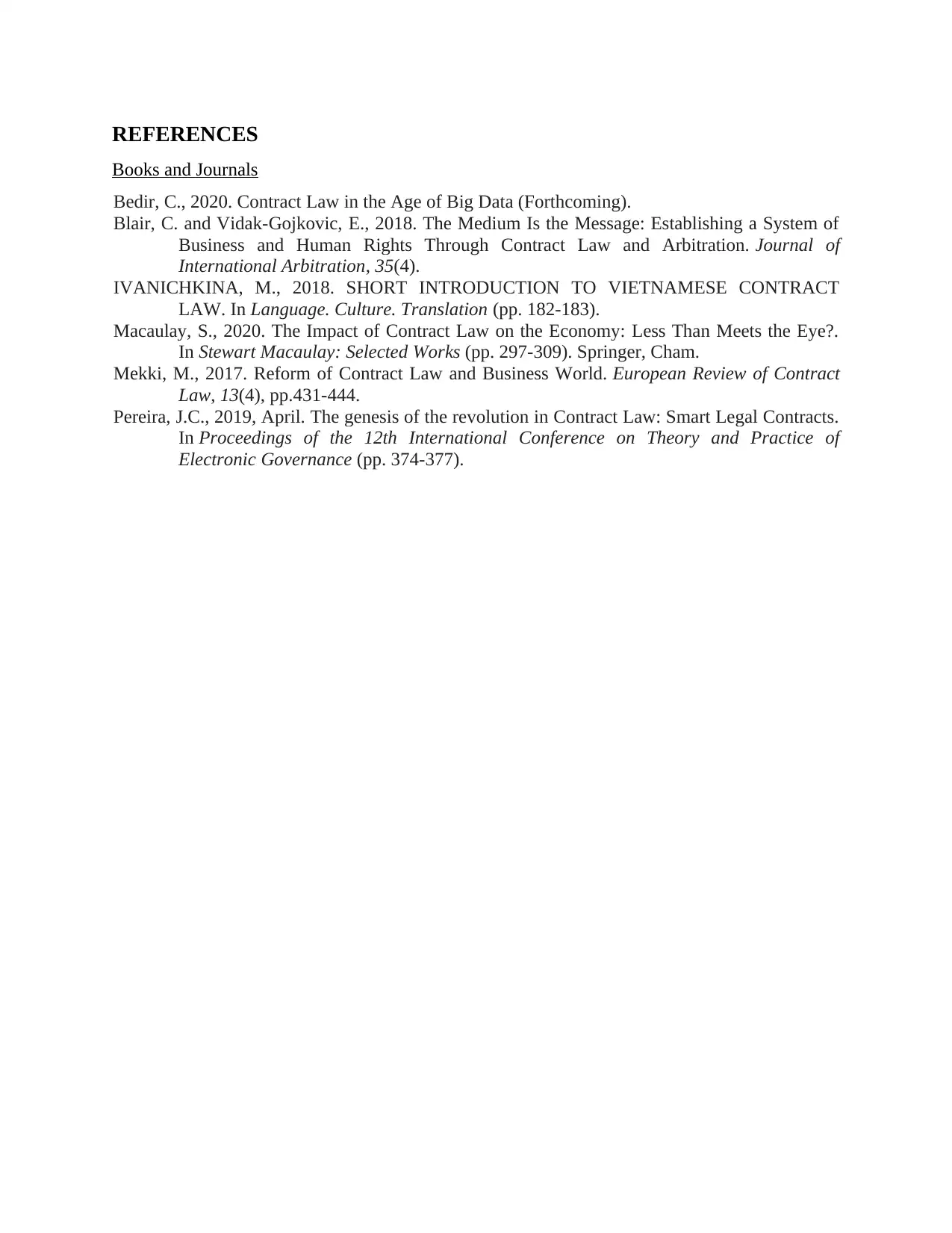
REFERENCES
Books and Journals
Bedir, C., 2020. Contract Law in the Age of Big Data (Forthcoming).
Blair, C. and Vidak-Gojkovic, E., 2018. The Medium Is the Message: Establishing a System of
Business and Human Rights Through Contract Law and Arbitration. Journal of
International Arbitration, 35(4).
IVANICHKINA, M., 2018. SHORT INTRODUCTION TO VIETNAMESE CONTRACT
LAW. In Language. Culture. Translation (pp. 182-183).
Macaulay, S., 2020. The Impact of Contract Law on the Economy: Less Than Meets the Eye?.
In Stewart Macaulay: Selected Works (pp. 297-309). Springer, Cham.
Mekki, M., 2017. Reform of Contract Law and Business World. European Review of Contract
Law, 13(4), pp.431-444.
Pereira, J.C., 2019, April. The genesis of the revolution in Contract Law: Smart Legal Contracts.
In Proceedings of the 12th International Conference on Theory and Practice of
Electronic Governance (pp. 374-377).
Books and Journals
Bedir, C., 2020. Contract Law in the Age of Big Data (Forthcoming).
Blair, C. and Vidak-Gojkovic, E., 2018. The Medium Is the Message: Establishing a System of
Business and Human Rights Through Contract Law and Arbitration. Journal of
International Arbitration, 35(4).
IVANICHKINA, M., 2018. SHORT INTRODUCTION TO VIETNAMESE CONTRACT
LAW. In Language. Culture. Translation (pp. 182-183).
Macaulay, S., 2020. The Impact of Contract Law on the Economy: Less Than Meets the Eye?.
In Stewart Macaulay: Selected Works (pp. 297-309). Springer, Cham.
Mekki, M., 2017. Reform of Contract Law and Business World. European Review of Contract
Law, 13(4), pp.431-444.
Pereira, J.C., 2019, April. The genesis of the revolution in Contract Law: Smart Legal Contracts.
In Proceedings of the 12th International Conference on Theory and Practice of
Electronic Governance (pp. 374-377).
1 out of 7
Related Documents
Your All-in-One AI-Powered Toolkit for Academic Success.
+13062052269
info@desklib.com
Available 24*7 on WhatsApp / Email
![[object Object]](/_next/static/media/star-bottom.7253800d.svg)
Unlock your academic potential
Copyright © 2020–2026 A2Z Services. All Rights Reserved. Developed and managed by ZUCOL.





